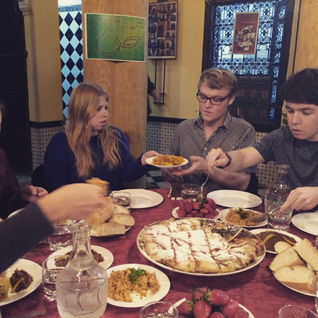A Semester in Morocco
From January to May 2015, I lived in Rabat, Morocco's capital city, studying Arabic and journalism at the Center for Cross-Cultural Learning.
|
It's been exactly one week since 60+ students and I moved into Hotel Darna, but I swear to you it feels like it's been one month. With a few exceptions, the majority of every day has had some sort of activity planned to prepare us for our semester in Rabat, both in terms of academics and culture. In other words, orientation for American college students in Morocco meant learning to bargain, navigating through the streets of Rabat and taking a crash course in Arabic. It also meant a brief potty training lesson, as many homes that students would be staying in might not be equipped with the western style toilet they are accustomed to. After a short lesson, we divided into groups and found ourselves in the heart of the medina, stopping in a handful of shops to feign interest in certain items before walking away, just as we were told to do. The idea, Badrdine explained, is to make the shopkeeper desperate enough to call you back and accept the price you offered him. I suppose it works in theory, but it didn't work fo us that day. I communicated as much as I could with the limited Moroccan dialect that I knew from our lesson that morning, but the conversation always transitioned into a sloppy combination of French and English. Life in the medina moves fast; there's no time for confusion where business is involved. Business deals require quick thinking and confidence... just like is needed for weaving in between the crowded, narrow roads of the medina's shops. The shopkeepers want to make a deal, and the sooner they can do so, the better.  Welcome dinner at the CCCL with everyone in the SIT Morocco program. Bastilla, veggies and fruits. Welcome dinner at the CCCL with everyone in the SIT Morocco program. Bastilla, veggies and fruits. We had our first session of survival Arabic session Thursday, maybe not so coincidentally the same day we met our homestay families. To my surprise, I had a lot to learn. The Moroccan dialect, called darja, is different from the Fus'ha (formal) that I learned at Loyola. When most Moroccans speak darja and not all are versed in Fus'ha, the year and a half I took of Arabic classes leading up to this trip only seems to be beneficial only for catching words here and there in everyday conversation. Otherwise, I'm just as at a loss conversing with locals as those who have no prior instruction in Arabic. Even the introductory phrases we learned differed considerably from the ones I was familiar with. Info session after info session went by, until the time finally came for us to meet the families. Undoubtedly the part of the week we anticipated most. At 4:30, we gathered on the first floor of the CCCL: Host families on one side, students on the other. Our families knew what we looked like and a variety of details we supplied on paperwork we completed several months ago, but we were kept in the dark until just before the families arrived. Badr stood in the middle of the room and began the uncomfortable process of initiating introductions between students and families. For every meeting, he called a student's name and asked him or her to step forward. Those of us not called anxiously sat and watched, hoping our name would be the next one that Badrdine asked for. The girls warmed up to me almost immediately. They're full of energy and keep me on my toes. Since they recognize the significant age different between us, they are especially amused by how little Arabic I know compared to them. They love to go around the house, point at things and dictate to me the darja word for them. They giggle at my mispronunciation and then do their best to correct me, but I'm certain there are times even after their corrections I butcher it again. Oussama is just like any other boisterous 16-year-old boy I know, and he has a pretty extensive knowledge of American rap music and American pop culture. He's already shown me around much of the medina, helped me sort out my phone, and introduced me to as many people as he can. I'm incredibly lucky to have a family member to mediate the more difficult conversations between myself and other family members. Altogether, I’ve been very lucky with how things turned out.
2 Comments
Adeline Murphy
2/2/2015 04:02:44 am
wonderful story Mary, looks like you are having a great time!
Reply
Leave a Reply. |
Archives
September 2016
Categories |